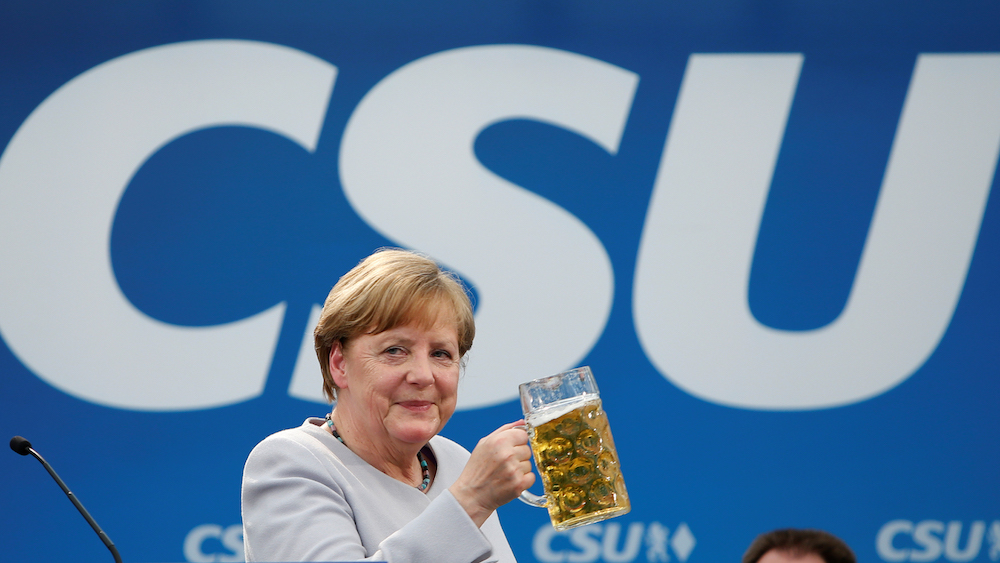Germany’s chancellor is a committed Atlanticist, but not a linguist. Combine that with the short attention span of the modern media and you have a problem.
As Germany marks 500 years of the Reformation, Martin Luther’s vernacular translation of the bible is still celebrated in his homeland as a linguistic marvel of clarity. East German pastor’s daughter Angela Merkel is a latter day linguistic marvel all of her own – for very different reasons.
On Sunday she surprised the world – or the world surprised her – after she apparently told a Munich beer tent that the postwar order was, in the era of Trump, no longer so orderly.
“The days in which we could completely depend on others are, in some ways, over, something I’ve experienced in the last few days,” said the German leader, just back from a weekend to remember with Donald Trump.
The US president had, in his first trip to Europe, reprimanded European NATO members’ defense under-spending and declined to join other G7 members in reaffirming the Paris climate change agreement.
Merkel’s remarks drew a thunderous reaction in Munich: Not because of her dig at Trump, but because of her conclusion. “Europe is a union of peace and freedom and it is worth fighting for,” she said. “We Europeans have to take our fate in our own hands.”
I understood Merkel’s remarks as a shot across Donald Trump’s bow, not directed against America but toward Europe. It was a wake-up call for the continent pulling together, as well as the opening shot – for domestic ears – in her re-election bid.
But within seconds her remarks – stripped of context and meaning, and translated into dozens of languages – had zipped around the world several times. Within hours they had taken on a life of their own, from “Merkel reads Trump riot act” to “Merkel collapses post-war order.” Small wonder, then, that her spokesman Steffen Seibert intervened on Monday to describe his boss as a “deeply committed Atlanticist.”
Sentences Like Matryoshka Dolls
If only she was as deeply committed a linguist. For years I have sympathized with my German colleagues who have to report on Angela Merkel in the original German. Her sentences often resemble Russian matryoshka dolls, with each sentence containing a sub-clause, which may contain another sub-clause, adjective, or non-sequitur.
On Sunday, for instance, she said the days in which Europe could completely depend on others were “ein Stück vorbei,” which you can translate as “partly over” or, as I did, “in some ways over.” In translation, it raises the blindingly obvious “partly pregnant” question: Is this age of dependability she refers to over, or isn’t it?
Plausible deniability and deliberate ambiguity are well-honed tools in the political toolbox. The trouble is that the German language, and German ears, are used to more clause-sub-clause tangos than the average English speaker can handle. That means options for deliberate ambiguity risk being lost in translation.
Combine that with the short attention span of the modern media – and Twitter’s character limit – and you have a problem.
For instance, many reports left out the second half of her call for Europe to take its fate in its own hands “… naturally in friendship with the United States of America and Great Britain.” She also tacked on Russia and others, too, but by that stage, who was listening?
Merkel German – on display in speeches and interviews – is a major contribution to her longevity in politics. It is the linguistic equivalent of a rubber room: durable, safe, impossible to escape or describe. Some language experts here have denounced the chancellor for demolishing the German language and rebuilding it into something that sounds like German but isn’t.
A journalist at DIE ZEIT weekly who once undertook to read all of Merkel’s Bundestag speeches wrote that “after three speeches you crave Japanese horseradish by the teaspoon just to fight the growing mental paralysis.”
Rhetorical Emergency Exits
Merkel is an expert at not painting herself into a corner. Even sentences that sound concrete, such as in Munich, always contain rhetorical emergency exits.
In translating Merkel, usually with gritted teeth, I always try to respect that and stay as close as I can to what she said. But the direct translation often exposes her contradictions even more and requires a little polish to make her comprehensible. Deciding how much polish is a subjective business.
Her outspoken predecessor, Gerhard Schröder, rarely needed rhetorical polish in translation. I can still remember his 2003 plea for his grumbling Social Democratic Party to back his controversial economic and social reforms: “Either we reform or we will be reformed by unchecked market forces.”
A year earlier, he staged a spectacular electoral comeback by warning US President George W. Bush that Germany would not engage in war games. He added, in my translation: “Under my leadership, (Germany) is not available for military misadventures”. He didn’t say misadventures in German, he said “Abenteuer” – adventures – but even so, the context was clear.
Things are less clear with Merkel. By avoiding the memorable and the concrete, she leaves herself wriggle room for the future but hands power over her message to others in the present.
These are often journalists in a rush, or working for a media outlet that – unlike my own – would never print Merkel, sub-clauses and all. They strip Merkel down to the bare bones and, in this version of reality, have her performing a foreign policy shift in a Munich beer tent.
No one is suggesting the German leader needs to sink to Trump’s “very bad” level, what European Commission president Jean-Claude Juncker dubbed “banal English.” But Munich is a reminder that, with the world listening, clear words from Merkel matter more than ever.







